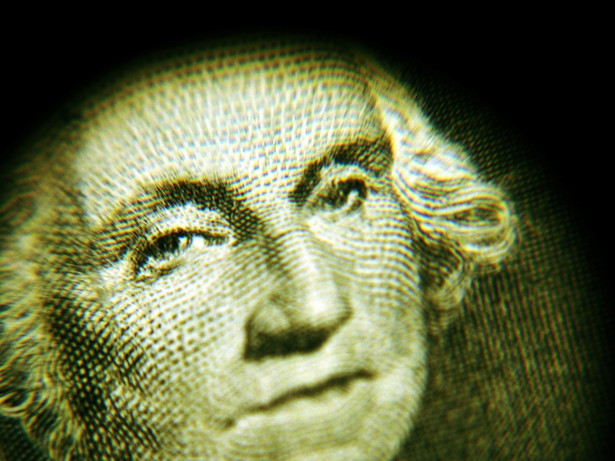
Reuters Pictures
In an impressive bit of digging, Matea Gold and Joseph Tanfani of the Los Angeles Times recently reported that the hitherto unknown Center to Protect Patient Rights (CPPR) secretly sent more than $55 million to right-wing organizations during the 2010 election.
The center gave tens of millions of dollars to these groups—all with seemingly innocuous names like the American Future Fund, 60 Plus, Americans for Job Security and the Susan B. Anthony List—that, according to the Times, were “behind a coordinated campaign against Democratic congressional candidates.” The largest contribution by far went to the American Future Fund, which allowed the group to run a series of dishonest ads against the Democrats in 2010. The fund spent at least $23 million on this effort, of which the majority came from CPPR—all part of a reported $304 million spent to support conservative candidates in the 2010 election cycle, according to the nonpartisan Center for Responsive Politics, much of it apparently coming out of the pockets of the Koch brothers.
Coincidentally, CPPR is staffed by many of the same people who have traditionally worked for the brothers Koch. Its chief is Sean Noble, who the LA Times piece (citing the blog Republic Report) notes is a “key operative in the Kochs’ political activities.” Heather Higgins, one of CPPR’s original directors, is chair of the Koch-funded Independent Women’s Forum. Cheryl Hillen, who raised $2.6 million for its operation, used to be the director of fundraising for the Kochs’ Citizens for a Sound Economy. Despite the noble-sounding name, however, it was no easy task for the Times reporters to learn about the Center to Protect Patient Rights, because virtually everyone they contacted regarding the organization tended to sound like a Mafia don before a Congressional committee when asked about their relationship. (The CPPR lists a Phoenix PO box as its address.)
Amazingly—and depressingly—these figures are small potatoes when compared with what the Koch brothers and their allies have in store for November. According to Politico, these groups “plan to spend roughly $1 billion on November’s elections for the White House and control of Congress, according to officials familiar with [their] internal operations,” with “Koch-related organizations” kicking in roughly $400 million of that. (The Koch figure alone is more than John McCain spent on his entire 2008 run for the presidency.)
The fact that we are learning about CPPR’s existence only now, two years after the midterm elections—and that we still know precious little about how it operates and on whose behalf—demonstrates just how profoundly the secret money power has been allowed to undermine our electoral system. Despite the attention that has been paid since the Citizens United decision, the power of money to shape our politics, our culture, even our imaginations remains vastly underestimated and little understood in contemporary political discourse. You can see it most transparently in our politics, but it is everywhere apparent, and the corruption it invites is almost equally ubiquitous.
Popular
"swipe left below to view more authors"Swipe →
In his famous prison notebooks, the Italian communist philosopher Antonio Gramsci identified, in the words of one of his scholarly interpreters, “an order in which a certain way of life and thought is dominant, in which one concept of reality is diffused throughout society in all its institutional and private manifestations, informing with its spirit all taste, morality, customs, religious and political principles, and all social relations, particularly in their intellectual and moral connotations.” Can it be a coincidence, in this context, that the top media executives who work hand in glove with politicians to shape our civic debate and discourse are among the wealthiest members of our society? I wrote about the power of money in the media in my last column, and I also addressed, back in March 2010, the problem posed by the extreme levels of pay demanded by celebrity anchors—tens of millions a year for the likes of Diane Sawyer and George Stephanopoulos—that were bankrupting news organizations and forcing the mass firings of people who actually produced “news.” But take a look at these recently released compensation figures for top media executives in 2011, as reported by the Associated Press:
§ Les Moonves, CBS, $69.9 million
§ David Zaslav, Discovery Communications, $52.4 million
§ Philippe Dauman, Viacom, $43 million
§ Robert Iger, Walt Disney, $31.4 million
§ Jeff Bewkes, Time Warner, $25.9 million.
William Cohan, who has written books about Bear Stearns and Goldman Sachs, believes there is “no doubt” that “these talented executives are worth every penny of their exorbitant pay: Profits at their companies are up, as are stock prices.” Well, perhaps, but it should come as no surprise that Cohan works for Michael Bloomberg. Is it shocking that people who take home tens of millions of dollars a year—payouts that come at the expense of hiring workaday reporters, editors, producers and the like—share many of the same views as the rest of their super-rich cohort, and that this might somehow be reflected in the political and cultural coverage that their organizations provide? So the next time you find yourself wondering just how the 1/100th of 1 percent managed to set up a system whereby they enjoy the lion’s share of our economy’s benefits while everybody else struggles just to tread water—and before Occupy Wall Street, no one in the mainstream media thought this was worth mentioning—well, now you have a clue. All that money spent by the Koch brothers and their friends to buy a friendly Congress, and perhaps a presidency, also means they can depend on the media to see things their way. That’s the way money talks in our society: to and for itself.


